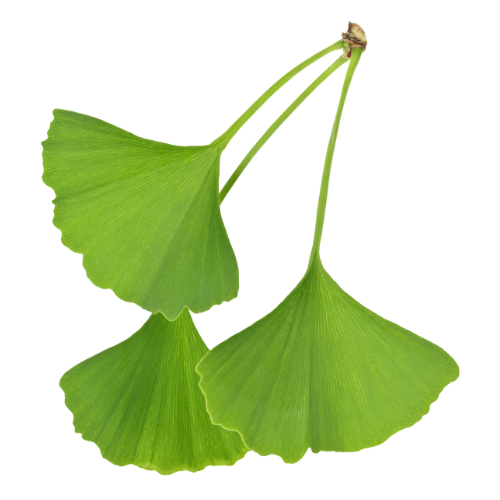
We love it for..
Memory Enhancer, Asthma
Ginkgo trees are widely cultivated for their leaves, which are an excellent herbal remedy for poor circulation and asthma.
Why We Love It
Ginkgo is thought to be the oldest tree on the planet, first growing about 190 million years ago. Though long used as a medicine in its native China, its therapeutic actions have only recently been researched. The leaves are used to treat poor circulation and to maintain a plentiful blood flow to the central nervous system. Ginkgo is also valuable for asthma and other allergic problems.
■ Chinese herbal medicine Ginkgo seeds are used to relieve wheezing and to lessen phlegm. They are also given to treat vaginal discharge, a weak bladder, and incontinence. The leaves are traditionally used for treating asthma.
■ Western herbal medicine Western interest in ginkgo has concentrated on the remarkable ability of the leaves to improve the circulation, especially poor circulation to the brain, and the herb’s antiallergenic and anti- inflammatory actions, which make it a particularly useful herbal remedy for the treatment of asthma. Ginkgo is a bestselling herbal medicine in France and Germany, where it is taken daily by millions of people from middle age onward to maintain and improve cerebral circulation and the memory, and to reduce the possibility of a stroke. It is also a valuable medicine to take after a stroke, where it is thought to support nerve tissue and strengthen the circulation.
Research Resources
| Scientific Name | Ginkgo biloba (Ginkgoaceae), Maidenhair Tree, Bai Guo (Chinese) |
| Description | A deciduous tree with one or several main trunks and spreading branches. It grows to 100 ft (30 m). |
| Constituents | Flavonoids, Ginkgolides, Bilobalides |
| Habitat & Cultivation | Native to China, ginkgo trees are grown in large-scale plantations in China, France, and in South Carolina in the U.S. They produce green to yellow fan-shaped leaves with radiating veins, and round fruits about 3 cm (1 in) across. Leaves and fruit are harvested in autumn. |
| Parts Used | Leaves improve the circulation. They are used to make tinctures, tablets, and fluid extract. Fresh leaf The husk of the ginkgo seed is removed before use. Seeds are prescribed by the Chinese for urinary problems and wheezing. |
| Key Actions | Circulatory tonic, Anti-inflammatory, Anti-asthmatic, Anti-allergenic, Antispasmodic |
| Cautions | Do not exceed the dose. May cause toxic reactions if taken to excess. Take on professional advice if using blood-thinning medication. Restricted herb in some countries. |
Clinical Studies
■ Clinical trials Extensive research since the 1960s has established the importance of ginkgo in improving poor cerebral circulation and aiding 100 memory and concentration. Several clinical trials have found that gingko proved useful as a treatment for dementia, including Alzheimer’s disease, although some studies have found no positive benefit. Other research indicates possible use in conditions as varied as depression, glaucoma, and poor peripheral arterial blood flow.
■ Anti-inflammatory action Ginkgo’s ability to reduce inflammation makes it valuable in conditions where nerve tissue is damaged by inflammation, for example multiple sclerosis.
■ Platelet activating factor (PAF) Ginkgo inhibits PAF, a substance released by a range of blood cells that causes the blood to become stickier and more likely to produce clots.
*Source: Encyclopedia of Herbal Medicine